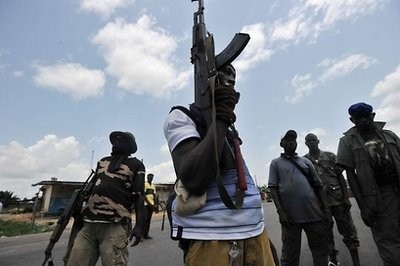Fighters backing internationally recognised president Alassane Ouattara claimed fresh gains in attacks across Ivory Coast, their biggest offensive yet against his rival Laurent Gbagbo.
Commanders of the Republican Forces said they had made gains in both the east and the west of the country during the day's fighting.
By late Monday, they had entered the eastern town of Bondoukau, near the border with Ghana, witnesses said, though it was as yet unclear if they had complete control of the area.

"Since 7:00 pm (1900 GMT), we are hearing Kalashnikov and heavy weapons fire," one resident told AFP. "They are telling us that Republican Forces have entered," she added.
A local journalist said there was no sign of Gbagbo's fighters in the town, only the Republican Forces. Another resident said locals had welcomed the pro-Ouattara fighters as they moved through in sports utility vehicles.
"We have taken Bondoukau and our guys are heading towards Tanda," further south, said a source at the Republican Forces' command centre in Bouake, in the centre of the country.
In the west, they clashed with troops loyal to Gbagbo in Duekoue, a strategic crossroads town and entry point to the country's main area of cocoa production. Ivory Coast is the world's biggest producer and exporter of cocoa.
Ouattara's army reported it was in control of the town, except for a "pocket of resistance", while the rival side said fighting was ongoing.
A source from Gbagbo's army chief of staff said there was "a general offensive along the entire frontline" that has split the country in two since a failed coup in 2002.
A source from Ouattara's Republican Forces army said: "In Daloa (centre west), we attacked the second battalion barracks and this morning we took the town of Bediola," he said.
The fighters were now moving into Dalao, the third biggest city in the country and entry to the cocoa belt, he added.
The Republican Forces are a regrouping of the New Forces ex-rebel movement which has controlled northern Ivory Coast since the failed 2002 coup against Gbagbo, whose forces control the south.
The pro-Ouattara forces have in recent weeks seized five towns in western Ivory Coast near the border with Liberia from Gbagbo troops.
Their latest push into Gbagbo-controlled areas comes exactly four months after the disputed November 28 election that started the latest unrest, which is feared could tip the country into full-blown civil war.
Gbagbo has refused to recognise the election authority's decision that he lost the vote and to cede power to Ouattara, internationally recognised as the rightful winner.
On the diplomatic front meanwhile, the stalemate continued.
Ouattara has rejected the African Union's choice of former Cape Verde foreign minister Jose Brito to mediate an end to the crisis, objecting that he had close links with Gbagbo.
"President Ouattara has his reasons, which I respect," Brito told AFP.
But he added: "I don't think it will be possible to advance if this position continues."
"I assume that the AU (African Union) will analyse this deadlock and decide on the best path to follow."
He argued however that his closeness with Gbagbo was a trump card and not a constraint.
In Paris, a lawyer for Ouattara deplored what he said were the double standards of the international community.
"They have launched an operation in Libya fearing that Kadhafi ... kills people in Benghazi, while Laurent Gbagbo has already started killing people and is continuing to do so," he added.
Ivory Coast's civilians deserved at least as much international public attention and concern as Libya's "unhappy people", he argued.
Aid agencies have reported massive displacement of people in the country's west which, along with Abidjan, has witnessed most of the violence.
The dire humanitarian crisis and the growing bloodshed has increased pressure on the international community to do more.
The UN Security Council is examining a draft resolution to strengthen the mandate of the UN peacekeeping mission in Ivory Coast and protect civilians.
























